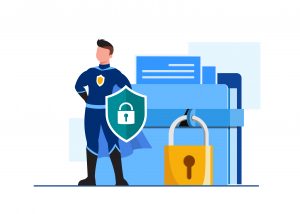
In today’s digital age, small businesses face increasing threats from cybercriminals. Protecting your business from online attacks and data breaches is essential for maintaining the trust of your customers and ensuring the longevity of your company. This article provides ten crucial cybersecurity measures that every small business should implement to safeguard their data and systems.
- Use Strong and Unique Passwords
Using strong and unique passwords for all accounts is a fundamental cybersecurity practice. A study by the National Institute of Standards and Technology (NIST) found that approximately 80% of data breaches are caused by weak or reused passwords. Avoid common passwords and include a combination of uppercase and lowercase letters, numbers, and special characters. Consider using a password manager to securely store and generate passwords for your various accounts. - Enable Multi-Factor Authentication (MFA)
Multi-Factor Authentication (MFA) adds an extra layer of security by requiring users to provide additional verification, such as a code sent to their mobile device, in addition to their password. According to Microsoft, enabling MFA can block 99.9% of account compromise attacks, significantly reducing the risk of unauthorized access, even if passwords are compromised. - Regularly Update Software and Systems
Keeping software, operating systems, and applications up to date with the latest security patches is crucial. Cybercriminals often exploit vulnerabilities in outdated software. In fact, the Verizon Data Breach Investigations Report states that 43% of data breaches are caused by vulnerabilities in software. Implement a regular patch management process to ensure timely updates and protect your business. - Conduct Employee Cybersecurity Training
Educating your employees about cybersecurity best practices is essential as they are often the first line of defense against cyber threats. According to the Ponemon Institute, 27% of data breaches result from negligent employees or contractors. Train them on identifying phishing emails, using strong passwords, recognizing suspicious websites, and practicing safe browsing habits. Regular training sessions and simulated phishing exercises can significantly reduce the risk of human error leading to security breaches. - Implement a Firewall
A firewall acts as a barrier between your internal network and the external internet, monitoring and controlling incoming and outgoing network traffic. It helps filter out potential threats and unauthorized access attempts, protecting your business from malicious activities. According to a study by Verizon, 76% of breaches were caused by external actors, making a firewall an essential defense mechanism. - Install Antivirus and Anti-Malware Software
Deploying reliable antivirus and anti-malware software helps detect and remove malicious software, such as viruses, worms, and ransomware. Ensure that the software is regularly updated to stay ahead of emerging threats. According to the AV-TEST Institute, there are over 350,000 new malware samples discovered every day, underscoring the importance of having robust antivirus and anti-malware protection. - Regularly Back Up Your Data
Implementing a regular data backup strategy is crucial for protecting your critical business information. Back up your data to an external hard drive or cloud storage, ensuring that backups are performed automatically and regularly. This practice helps mitigate the risks of data loss due to hardware failure, theft, or ransomware attacks. The Cybersecurity Ventures 2019 Official Annual Cybercrime Report predicts that ransomware attacks will cost businesses around the world $20 billion by 2021, highlighting the importance of having secure and up-to-date backups. - Secure Your Wi-Fi Network
Securing your business’s Wi-Fi network is vital to prevent unauthorized access and potential data breaches. Change the default administrator passwords on routers, use strong encryption protocols (such as WPA2 or WPA3), and regularly update the router’s firmware to protect against known vulnerabilities. Segregating guest Wi-Fi from your main network also helps protect sensitive data. The 2020 Data Breach Investigations Report found that 80% of hacking-related breaches involved compromised credentials, making Wi-Fi security a critical aspect of overall cybersecurity. - Limit Access to Data
Grant access to sensitive data and systems only to authorized personnel. Implement user roles and access controls to ensure that employees have access to only the data necessary for their specific roles. Regularly review and update user permissions as employees’ responsibilities change. The principle of least privilege (PoLP) minimizes the potential damage that can occur in the event of a breach or insider threat. - Develop an Incident Response Plan
Preparing for cybersecurity incidents by developing an incident response plan is crucial to minimize the impact and ensure a swift and effective response. The plan should include steps to be taken in the event of a data breach, including isolating affected systems, notifying appropriate parties, and conducting a thorough investigation to identify the cause and prevent future incidents. The 2020 Cost of a Data Breach Report by IBM found that having an incident response team reduced the average cost of a data breach by $2 million.
By implementing these ten cybersecurity measures, small businesses can significantly reduce the risk of cyber threats and protect their valuable data. Prioritize cybersecurity as an integral part of your business strategy to build trust with your customers and ensure the long-term success of your company.



